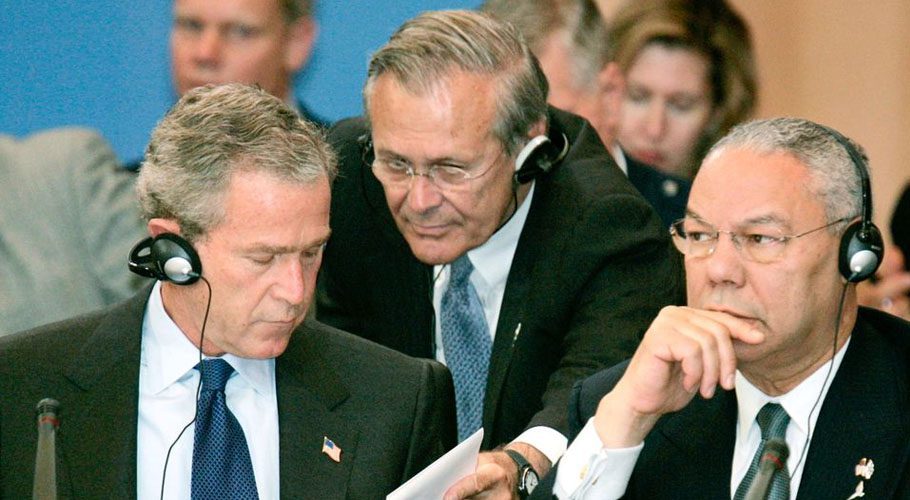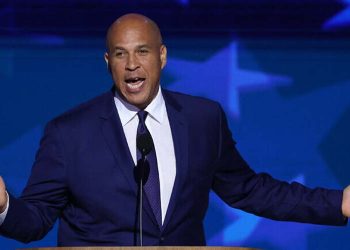WASHINGTON: US defense secretary Donald Rumsfeld, who was the main architect of the Iraq war until President George W. Bush replaced him, has died at age 88, his family said in a statement.
Rumsfeld, who ranks with Vietnam War-era defense secretary Robert McNamara as the most powerful men to hold the post, brought charisma and bombast to the Pentagon job. Only McNamara served as defense secretary for longer than Rumsfeld, who had two stints – from 1975 to 1977 under President Gerald Ford, for whom he also served as White House chief of staff, and from 2001 to 2006 under Bush.
With Rumsfeld in charge, US forces swiftly toppled Iraqi President Saddam Hussein but failed to maintain law and order in the aftermath, and Iraq descended into chaos with a bloody insurgency and violence. US troops remained in Iraq until 2011, long after he left his post.
Rumsfeld played a leading role ahead of the war in making the case to the world for the March 2003 invasion. He warned of the dangers of Iraqi weapons of mass destruction but no such weapons were ever discovered.
Rumsfeld was known for imperious treatment of some military officers and members of Congress and infighting with other members of the Bush team, including Secretary of State Colin Powell. He also alienated US allies in Europe.
In 2004, Bush twice refused to accept Rumsfeld’s offer to resign after photos surfaced of US personnel abusing prisoners at the Abu Ghraib prison outside Baghdad. The scandal triggered international condemnation of the United States.
Rumsfeld personally authorized harsh interrogation techniques for detainees. The US treatment of detainees in Iraq and foreign terrorism suspects at a special prison set up under Rumsfeld at the U.S. naval base at Guantanamo Bay, Cuba, drew international condemnation, with human rights activists and others saying prisoners were tortured.
He was a close ally of Bush’s vice president, Dick Cheney, who had worked for Rumsfeld during the 1970s Republican presidencies of Richard Nixon and Ford. Rumsfeld became a lightning rod for criticism and, with the Iraq war largely a stalemate and public support eroding, Bush replaced him in November 2006 over Cheney’s objections.

Days after vowing Rumsfeld would remain for the rest of his term, Bush announced his departure a day after mid-term elections in which Democrats took control of Congress from Republicans amid voter anger over the Iraq War.
Robert Gates, a soft-spoken but demanding former CIA director, took over from Rumsfeld in December 2006 and made sweeping strategic and military leadership changes in Iraq.
Many historians and military experts blamed Rumsfeld for decisions that led to difficulties in Iraq. For example, Rumsfeld insisted on a relatively small invasion force, rejecting the views of many generals. The force was insufficient to stabilize Iraq when Saddam fell. Rumsfeld also was accused of being slow to recognise the emergence of the insurgency in 2003 and the threat it posed.
Rumsfeld also oversaw the US invasion of Afghanistan in 2001 to oust the Taliban leaders who had harbored the al Qaeda leaders responsible for the Sept. 11 attacks on the United States. As he did in Iraq two years later, Rumsfeld sent a small force to Afghanistan, quickly chased the Taliban from power and then failed to establish law and order.
US forces during Rumsfeld’s tenure also were unable to track down Osama bin Laden. The al Qaeda chief slipped past a modest force of US special operations troops and CIA officers along with allied Afghan fighters in the Afghan mountains of Tora Bora in December 2001.
During his time away from public service, Rumsfeld became wealthy as a successful businessman, serving as chief executive of two Fortune 500 companies. In 1988, he briefly ran for the Republican US presidential nomination.
Rumsfeld also served as a Navy pilot, US NATO ambassador and was elected to the US House of Representatives. He and wife Joyce had three children.



































